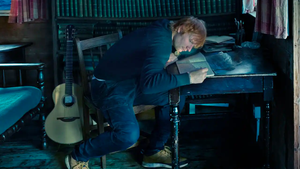Ed Sheeran did not infringe the copyright in Marvin Gaye’s ‘Let’s Get It On’ when he wrote his 2014 song ‘Thinking Out Loud’. Which I think we already knew, but now we have confirmation of that fact in a US courtroom. The jury deliberating on the latest high profile song-theft case yesterday quickly ruled in Sheeran’s favour.
It was the estate of Ed Townsend, who co-wrote ‘Let’s Get It On’, that accused Sheeran of ripping off the earlier song when he created ‘Thinking Out Loud’. They first sued for copyright infringement all the way back in 2016. Partly because of COVID-caused delays it took nearly seven years for the case to get to trial. It took the jury just two and half hours to decide that there wasn’t a case for copyright infringement here.
The Sheeran side argued throughout that there were similarities between ‘Let’s Get It On’ and ‘Thinking Out Loud’ simply because they were created using the same musical building blocks.
In the words of Sheeran’s lawyer Ilene Farkas during closing arguments this week: “Ed Townsend did not create these basic musical building blocks. Ed Townsend was not the first songwriter to use and combine these elements. It was not original”.
Farkas also cautioned that any decisions that said ‘Thinking Out Loud’ infringed the ‘Let’s Get It On’ copyright would have a damaging impact on the art of songwriting. “You would be removing an essential element in every songwriter’s toolkit”, she declared. “Is that really what we want to do to music?”
For the plaintiffs, a video of a 2014 live performance in which Sheeran himself mashed together ‘Thinking Out Loud’ and ‘Let’s Get It On’ was key evidence. Indeed, legal rep Ben Crump called it the “smoking gun”.
But on the witness stand, Sheeran argued that you can mash together lots of pop songs in that way, because lots of pop songs are constructed out of similar musical segments. And those individual segments – his legal team insisted – are not protected by copyright in isolation.
At one point during his testimony Sheeran threatened to quit music if he lost the case. Noting that threat when responding to yesterday’s judgement, he said: “It looks like I’m not going to have to retire from my day job after all”.
While clearly pleased with the jury’s conclusion, he added: “At the same time I am absolutely frustrated that baseless claims like this are allowed to go to court at all. If the jury had decided this matter the other way we might as well say goodbye to the creative freedom of songwriters”.
Of course, Sheeran could have stopped the case from going to court by trying to settle early on, which is what some artists faced with song-theft claims choose do. Indeed, Sheeran himself did that when he was accused of ripping off Matt Cardle track ‘Amazing’ on his song ‘Photograph’.
Although, discussing that claim last year, Sheeran’s co-writer on ‘Photograph’, Johnny McDaid, insisted that “it was not settled because we believed that we had copied ‘Amazing’ in any way”. Rather, he said, following the big ‘Blurred Lines’ ruling in the US in 2015, it felt like there was “a culture” of copyright trials in America which were not “going favourably for songwriters at all”.
However, you sense that the Sheeran team ultimately decided that while settling song-theft claims had short-term benefits and saved Sheeran himself the stress of appearing in court, in the long-term it opened him up to ever more dubious claims. “I am not and will never allow myself to be a piggy bank for anyone to shake”, he added in his post-judgement statement yesterday.
And by Sheeran letting this case – and the ‘Shape Of You’ song-theft lawsuit that was filed in the UK – proceed to court, we’ve had some clarity on copyright matters in this domain on both sides of the Atlantic.
In the UK case, which Sheeran won last year, we got confirmation that, under UK law at least, less well-known songs simply being available to stream is not sufficient to prove another artist had access to them.
Meanwhile, the ‘Thinking Out Loud’ judgement reaffirms the recent trend in American song-theft cases that short musical segments can’t and shouldn’t enjoy copyright protection in isolation. Any appeals pending of course. Though generally appeal judges are even more cautious on this than juries.
Will that stop the flow of song-theft claims against Sheeran and others? We shall see. There is actually other litigation currently going through the motions relating to the same specific claim that ‘Thinking Out Loud’ infringes ‘Let’s Get It On’, filed by an entity that has a share in the latter song’s copyright. It remains to be seen what impact yesterday’s judgement has on that case.
In the meantime, please we can ensure that any lawyer considering getting involved in music copyright cases at the very least first watches one version or another of Axis Of Awesome’s ‘Four Chords’ song. Thank you.

